arrive, get与reach的用法区别
arrive in, arrive at, reach, get to
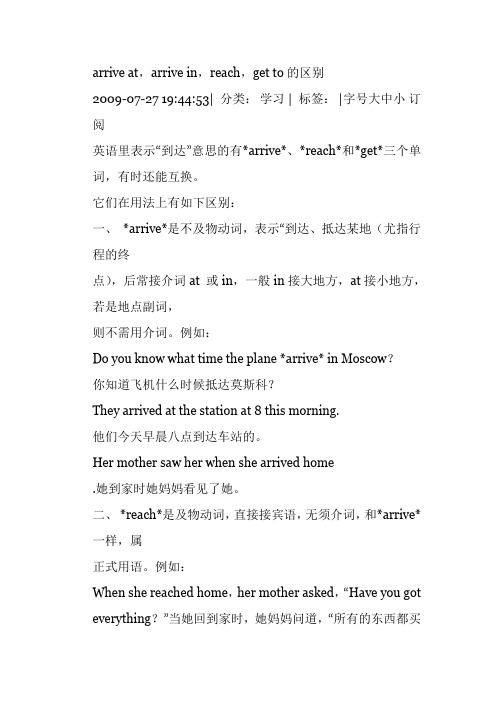
arrive at,arrive in,reach,get to的区别2009-07-27 19:44:53| 分类:学习 | 标签: |字号大中小订阅英语里表示“到达”意思的有*arrive*、*reach*和*get*三个单词,有时还能互换。
它们在用法上有如下区别:一、*arrive*是不及物动词,表示“到达、抵达某地(尤指行程的终点),后常接介词at 或in,一般in接大地方,at接小地方,若是地点副词,则不需用介词。
例如:Do you know what time the plane *arrive* in Moscow?你知道飞机什么时候抵达莫斯科?They arrived at the station at 8 this morning.他们今天早晨八点到达车站的。
Her mother saw her when she arrived home.她到家时她妈妈看见了她。
二、*reach*是及物动词,直接接宾语,无须介词,和*arrive*一样,属正式用语。
例如:When she reached home,her mother asked,“Have you got everything?”当她回到家时,她妈妈问道,“所有的东西都买了吗?”They reached Beijing on February 17.他们于二月十七日到达北京。
三、和*arrive*一样,*get*也是不及物动词,只是它多用于口语,其后接的介词是to,后面如接副词,则不用介词to。
例如:I *get* to school at about 7:30 every day,and I *get* home at 5:00 in the afternoon..我每天7:30到校,下午5:00到家。
Have we got to the zoo yet?我们到动物园了吗?The visitors got there last night.参观的人昨晚到这儿的。
辨析reach--get-to-与-arrive的用法与区别

Reach ,get to 与arrive 用法区别
reach
“到达” get to 某地
arrive
及物动词,后直接接 宾语。
后接地点名词,若接 home, here, there则 省去to.
后结大地点名词加in, 小地点名词加at.接地 点副词不用介词。
reach Hangzhou reach home get to school get home
6
单项选择
1.When he arrived __C___ the station, the train had left.
A to B in C at D /
2.Please tell me when the bus___A_______.
A arrives B arrives at C reaches D reaches in
辨析reach, get to 与 arrive
1
Reach, get to 与arrive 的用法与区别
• 我们都知道:reach,get to 和arrive 这三 个都有“到达”某地之意,那它们的用法 是否有区别?各自的用法又是怎样?下面 我们来具体的学习。
• 1 reach的用法。 • 它是及物动词,后面直接接表地点的名词
或副词,不需要添加任何介词。例如: • They reached Hangzhou yesterday. • When did you reach home?
2
2 get to的用法
• 首先得说明单独的get 是没有表示“到达” 之意的,它必须和to 连用才能表示到达。 例如:1.How can I get to the hospital? 2.I usually get to school on foot. 但是如果接表地点的副词则“to”省去。例如: 1.I got home at five o’clock in the afternoon. 2.I didn’t get here until twelve thirty.
arriveto、reachto和getto的区别
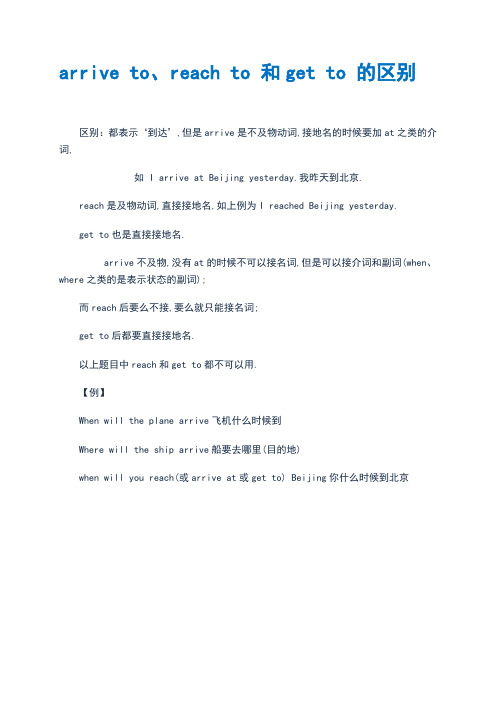
arrive to、reach to 和get to 的区别
区别:都表示‘到达’,但是arrive是不及物动词,接地名的时候要加at之类的介词,
如 I arrive at Beijing yesterday.我昨天到北京.
reach是及物动词,直接接地名,如上例为I reached Beijing yesterday.
get to也是直接接地名.
arrive不及物,没有at的时候不可以接名词,但是可以接介词和副词(when、where之类的是表示状态的副词);
而reach后要么不接,要么就只能接名词;
get to后都要直接接地名.
以上题目中reach和get to都不可以用.
【例】
When will the plane arrive飞机什么时候到
Where will the ship arrive船要去哪里(目的地)
when will you reach(或arrive at或get to) Beijing你什么时候到北京。
英语 arrive 与 reach 和 get to 的区别
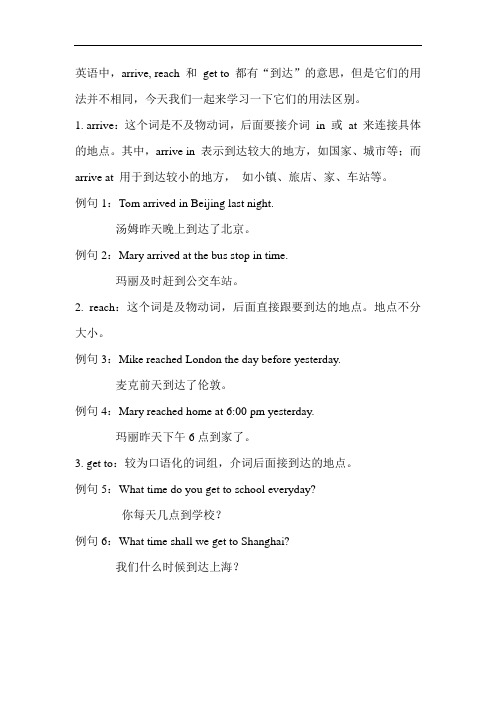
英语中,arrive, reach 和get to 都有“到达”的意思,但是它们的用法并不相同,今天我们一起来学习一下它们的用法区别。
1. arrive:这个词是不及物动词,后面要接介词in 或at 来连接具体的地点。
其中,arrive in 表示到达较大的地方,如国家、城市等;而arrive at 用于到达较小的地方,如小镇、旅店、家、车站等。
例句1:Tom arrived in Beijing last night.
汤姆昨天晚上到达了北京。
例句2:Mary arrived at the bus stop in time.
玛丽及时赶到公交车站。
2. reach:这个词是及物动词,后面直接跟要到达的地点。
地点不分大小。
例句3:Mike reached London the day before yesterday.
麦克前天到达了伦敦。
例句4:Mary reached home at 6:00 pm yesterday.
玛丽昨天下午6点到家了。
3. get to:较为口语化的词组,介词后面接到达的地点。
例句5:What time do you get to school everyday?
你每天几点到学校?
例句6:What time shall we get to Shanghai?
我们什么时候到达上海?。
reach , get to ,arrive 例句

reach , get to ,arrive 例句(最新版)目录1.介绍"reach"、"get to"和"arrive"的含义和用法2.详细分析三个词的异同3.通过例句说明三个词的使用场景和注意事项正文一、介绍"reach"、"get to"和"arrive"的含义和用法"reach"、"get to"和"arrive"都是表示到达某个地方的动词,它们在英语中非常常用。
二、详细分析三个词的异同1."reach""reach"表示到达某个地方,强调到达的动作。
它的用法比较直接,通常直接接地点。
2."get to""get to"也表示到达某个地方,和"reach"的含义类似,但比"reach"更口语化。
它通常用于表示到达某个地方的过程。
3."arrive""arrive"强调到达某个地方的结果,通常用于较为正式的场合。
它通常用于表示到达某个地方的时间。
三、通过例句说明三个词的使用场景和注意事项1."reach"的例句:I reached the park at 10 am.(我上午 10 点到达了公园。
)在这个例句中,"reach"表示我到达公园的动作。
2."get to"的例句:How did you get to know her?(你是怎么认识她的?)在这个例句中,"get to"表示了解某人的过程。
3."arrive"的例句:We arrived at the airport at 6 am.(我们早上 6 点到达了机场。
arrivein,arriveat,reach和getto的用法和区别

arrivein,arriveat,reach和getto的用法和区别辨析:reach,get to和arrive in(at)这一组词均表达“到达”之意。
reach 是及物动词,后面必须接表地点的名词做宾语;get必须和to一起表示“到达”之意,arrive是不及物动词,其后若接大地点时,常用介词in,若接小地点时,则用介词at,若是用副词表达地点,get to 和arrive in (at)后面的介词均省去。
例如:1) We arrived at the station five minutes late. 我们到车站晚了五分钟。
2) They will arrive in Paris next Monday. 他们将于下周星期一到达巴黎。
3) How can I get to the post office? 我怎样才能到达邮局。
4) They reached the top of the mountains. 他们到达了山顶。
练习:一.用arrive in、arrive at、get to、reach的适当形式填空。
1. We __________ the station five minutes late. 我们到车站晚了5 分钟。
2. They will __________Paris next Monday. 他们将于下周星期一到达巴黎。
3. When we __________ the park, it began to rain.我们到达公园时,就开始下雨了。
4. He__________ Beijing yesterday. 他昨天到达北京。
5. When did he __________ home yesterday? 昨天他什么时候到家?6.Your letter___________ me last week. 我是上周收到你的信的。
7. He has__________school age. 他已达到上学年龄。
到达的三种英语短语

到达的三种英语短语
到达有许多种表达方式,无论是英语或其他任何语言,都可以定
义这个概念。
以英语而言,有三种主要的表达方式可以用来描述到达,即arrive、reach、get there。
可以用这三种短语指的是首先到达某地,也可以表达个人抵达或到达目标的意思。
首先,到达可以表达为arrive,意思是抵达某一地点,在发音时arrive有“a-ri-ve”这样的发音,这个词同时也是动词,可以加上形容词来描述。
例如:We arrived late。
我们很晚才到达。
其次,reach也可以表达到达的意思。
这个词有“ri-ch”的发音,是一个动词,常常用来表示把某物传送到某地,但它也可以用来表达
到达的意思。
例如:I'm glad we reached the destination safely。
我很高兴我们安全的到达了目的地。
最后,get there也是表达到达的一种方式。
在发音时,get
there有“get-ze-re”的发音,这是一个短语,通常用来表达抵达某
地旅程的最终目的地。
例如:I'm so glad we finally got there。
我很高兴我们最终到达了那个地方。
从以上可以看出,arrive、reach和get there都是用来表达到达的英语短语,每个短语都有其特定含义,有了它们,便可快速准确地表达出到达的概念。
总之,arrive、reach和get there都可以用来表达到达的概念,而且各有不同的含义和用法,学会使用它们能够帮助人们更清晰,更直接地表达自己的意思,从而提高说话的精准度和质量。
英语中的“到达”reach,arrive与get的区别

英语中的“到达”reach,arrive与get的区别1.reach是及物动词它后面可以直接跟表示地点的名词作宾语2. arrive作不及物动词,意为“到达”,其后需先接介词in或at 后再接表示地点的名词。
接较大地点时用in,接较小地点时用at3.get后接名词时,须在get后先接to注意—— arrive与get后接here,there,home等地点副词时不加介词。
练习()1. Her mother arrived_____ Hainan _____the first day of her schoolA In In B.on on C. at on DIn on()2. What time does your father____after work every day?A get to home.B get homeC arrive at homeD arrive in home()3. -How do you usually _____school ,by bus or on foot?Neither. I go to school by bikeA. get toB.arriveC. arrive inD. get中考文言文阅读练习第4天阅微草堂笔记(节选)京师花本最古者,首给孤寺①。
吕氏藤花,次则余家之青桐,皆数百年物也。
吕氏宅后售与高太守兆煌,又转售程主事振甲,藤今犹在,其架用梁栋之材,始能支拄。
其阴覆厅事一院,其蔓旁引,又覆西偏书室一院。
花时如紫云垂地,香气袭衣。
慕堂②在日,或自宴客,或友人借宴客,觞咏殆无虚夕③。
迄今四十馀④年,再到曾游,已非日主,殊深邻笛之悲⑤)(节选自清·纪旳《阅微草堂笔记》,有删减注】①给孤寺:寺名。
②慕堂:吕元龙,乾隆时举人,曾与作者同窗。
③觞咏殆无虚タ:饮酒赋诗,几乎没有空过一个晚上。
④馀:同“余”。
⑤邻笛之悲:是哀念亡友的典故1.根据要求,完成下列两小题。
arriveinarriveatreach和getto的用法和区别
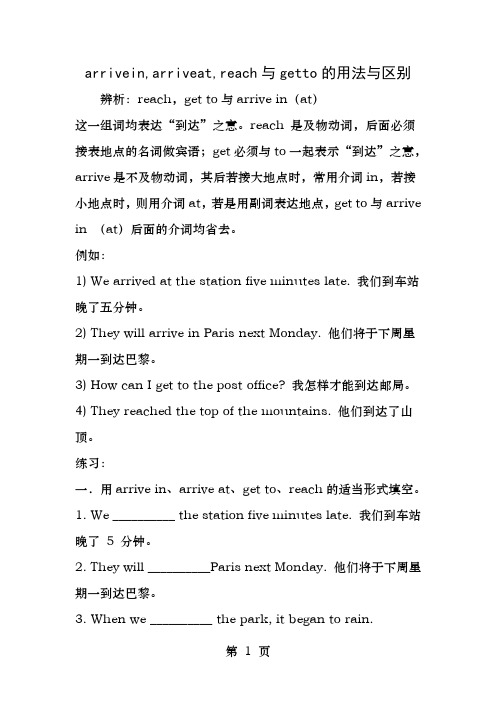
arrivein,arriveat,reach与getto的用法与区别辨析:reach,get to与arrive in(at)这一组词均表达“到达”之意。
reach 是及物动词,后面必须接表地点的名词做宾语;get必须与to一起表示“到达”之意,arrive是不及物动词,其后若接大地点时,常用介词in,若接小地点时,则用介词at,若是用副词表达地点,get to与arrive in (at)后面的介词均省去。
例如:1) We arrived at the station five minutes late. 我们到车站晚了五分钟。
2) They will arrive in Paris next Monday. 他们将于下周星期一到达巴黎。
3) How can I get to the post office? 我怎样才能到达邮局。
4) They reached the top of the mountains. 他们到达了山顶。
练习:一.用arrive in、arrive at、get to、reach的适当形式填空。
1. We __________ the station five minutes late. 我们到车站晚了5 分钟。
2. They will __________Paris next Monday. 他们将于下周星期一到达巴黎。
3. When we __________ the park, it began to rain.我们到达公园时,就开始下雨了。
4. He__________ Beijing yesterday. 他昨天到达北京。
5. When did he __________ home yesterday? 昨天他什么时候到家?6.Your letter___________ me last week. 我是上周收到你的信的。
7. He has__________school age. 他已达到上学年龄。
arrive等到达的三个动词辨析及练习

2.Those foreign visitors ___ our city the day before yesterday. A. arrived B. reached C. reached to D. got in
3. Remember to ring me up as soon as you get to London. (同义句)
5. The must ______ there on time. (arrive)
6. She _________school at about 7:30 every day. 7. Have we _________ the zoo yet?
1.Theynight. A. at, in B. in, on C. at, on D. in, at
Practice
请连线
arrive at
arrive in
Beijing the bus station Paris Japan school Nanjing the town China the village the school gate
一、填空
1. My mother usually gets ___ school at 7:40 in the morning.
2. When do you usually arrive ____ the bus station? 3. Jenny’s uncle usually arrives ___ Shanghai in the
evening.
4. Her mother saw her when she __________home.(get)
3. Call me when you arrive.
辨析reach-get-to-与-arrive

练一练:选择、每空一词
1. How did you ___D___ here? A get to B arrive at C arrive in D reach
2. I reached New York City last Friday.(改同义句) I ____g_ot__to___ New York City last Friday. I _a_r_r_iv_e_d__i_n_ New York City last Friday.
3.不说明到达的地点时
the village at last. 3. Call me when you arrive.
reach vt. reach+地点 get to vi. get to+地点
1. How did your father reach his office? 2. Finally, he reached the top of the mountain.
3. Her mother saw her when she _g_o_t_(get) home. 4. They will _a_rr_i_ve_ in London next. 5. I want to go to a post office. How can I _a_r_ri_v_e_/g_e_t_/r_e_a_c_h_ there? 6. John _r_e_a_c_h_e_d_ the top of the mountain finally.
课堂小结:
arrive, reach, get to辨析
arrive vi. 1.arrive in +大地点
1. Mr. Wang arrived in
(国家,地区,城市等)
arrive, get与reach的用法区别

arrive, get与reach的用法区别三者均可表示“到达”,区别如下:■arrive 和 get 都是不及物动词,前者较正式,后者则较口语化。
两者之后均不可接宾语,但可接 here, there, home 之类的表地点的副词作状语。
如: What time does the train arrive? 火车什么时候到? We got [arrived] here last night. 我们昨晚到这儿。
要表示“到达某地”,需借助适当介词:1. arrive 之后通常接介词 at (一般用于较小的地方)或 in (一般用于较大的地方)。
如: We arrived at the station five minutes late. 我们到车站晚了 5 分钟。
They will arrive in Paris next Monday. 他们将于下周星期一到达巴黎。
2. get 之后通常接介词 to。
如: When we got to the park, it began to rain. 我们到达公园时,就开始下雨了。
在谈到火车、汽车等或乘客等到站时,通常用 get in。
如: The bus gets in at five thirty. 汽车五点半到站。
■reach 通常是及物动词(较 get 更正式),其后可直接跟地点名词作宾语(不能用介词)。
如: He reached Beijing yesterday. 他昨天到达北京。
注:reach 之后也可接 here, there, home 等词。
如:When did he reach home yesterday? 昨天他什么时候到家? 顺便说一句:reach 除可表示到达某地外,还用于其它意义的到达。
如:Your letter reached me last week. 我是上周收到你的信的。
He has reached school age. 他已达到上学年龄。
初三必看:arrive to、reach to 和get to 的区别

初三必看:arrive to、reach to 和get to 的区别
区别:都表示‘到达’,但是arrive是不及物动词,接地名的时候要加at之类的介词, 如 I arrive at Beijing yesterday.我昨天到北京。
reach是及物动词,直接接地名,如上例为I reached Beijing yesterday.
get to也是直接接地名。
arrive不及物,没有at的时候不可以接名词,但是可以接介词和副词(when、where之类的是表示状态的副词);
而reach后要么不接,要么就只能接名词;
get to后都要直接接地名。
以上题目中reach和get to都不可以用。
【例】
When will the plane arrive?飞机什么时候到?
Where will the ship arrive?船要去哪里?(目的地)
when will you reach(或arrive at或get to) Beijing?你什么时候到北京?。
arriveinarriveat,reach和getto的用法和区别

a r r i v e i n,a r r i v e a t,r e a c h和g e t t o的用法和区别辨析:reach,get to和arrive in(at)这一组词均表达“到达”之意。
reach 是及物动词,后面必须接表地点的名词做宾语;get必须和to一起表示“到达”之意,arrive是不及物动词,其后若接大地点时,常用介词in,若接小地点时,则用介词at,若是用副词表达地点,get to和arrive in (at)后面的介词均省去。
例如:1) We arrived at the station five minutes late. 我们到车站晚了五分钟。
2) They will arrive in Paris next Monday. 他们将于下周星期一到达巴黎。
3) How can I get to the post office? 我怎样才能到达邮局。
4) They reached the top of the mountains. 他们到达了山顶。
练习:一.用arrive in、arrive at、get to、reach的适当形式填空。
1. We __________ the station five minutes late. 我们到车站晚了5 分钟。
2. They will __________Paris next Monday. 他们将于下周星期一到达巴黎。
3. When we __________ the park, it began to rain.我们到达公园时,就开始下雨了。
4. He__________ Beijing yesterday. 他昨天到达北京。
5. When did he __________ home yesterday? 昨天他什么时候到家?letter___________ me last week. 我是上周收到你的信的。
7. He has__________school age. 他已达到上学年龄。
表示到达的单词
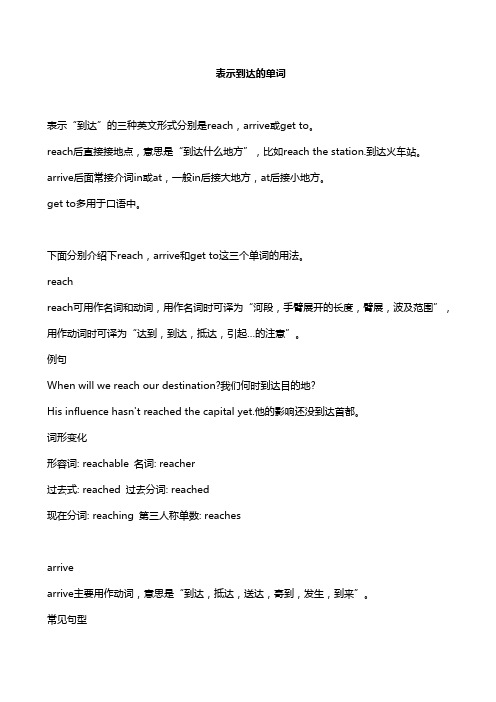
表示到达的单词表示“到达”的三种英文形式分别是reach,arrive或get to。
reach后直接接地点,意思是“到达什么地方”,比如reach the station.到达火车站。
arrive后面常接介词in或at,一般in后接大地方,at后接小地方。
get to多用于口语中。
下面分别介绍下reach,arrive和get to这三个单词的用法。
reachreach可用作名词和动词,用作名词时可译为“河段,手臂展开的长度,臂展,波及范围”,用作动词时可译为“达到,到达,抵达,引起…的注意”。
例句When will we reach our destination?我们何时到达目的地?His influence hasn't reached the capital yet.他的影响还没到达首都。
词形变化形容词: reachable 名词: reacher过去式: reached 过去分词: reached现在分词: reaching 第三人称单数: reachesarrivearrive主要用作动词,意思是“到达,抵达,送达,寄到,发生,到来”。
常见句型We shall arrive soon after.我们将很快就到达。
You must arrive at the airport two hours early.你必须提前两小时到达机场。
He arrived punctually at four o'clock.他在四点钟准时到达。
词态变化名词: arriver 过去式: arrived过去分词: arrived 现在分词: arriving 第三人称单数: arrivesget toget to的意思是“到达,开始,抵达,抓住,接触,和…取得联系”。
造句Have we got to the zoo yet? 我们到动物园了吗?。
- 1、下载文档前请自行甄别文档内容的完整性,平台不提供额外的编辑、内容补充、找答案等附加服务。
- 2、"仅部分预览"的文档,不可在线预览部分如存在完整性等问题,可反馈申请退款(可完整预览的文档不适用该条件!)。
- 3、如文档侵犯您的权益,请联系客服反馈,我们会尽快为您处理(人工客服工作时间:9:00-18:30)。
arrive, get与reach的用法区别
三者均可表示“到达”,区别如下:
■arrive 和 get 都是不及物动词,前者较正式,后者则较口语化。
两者之后均不可接宾语,但可接 here, there, home 之类的表地点的副词作状语。
如:
What time does the train arrive? 火车什么时候到?
We got [arrived] here last night. 我们昨晚到这儿。
要表示“到达某地”,需借助适当介词:
1. arrive 之后通常接介词 at (一般用于较小的地方)或 in (一般用于较大的地方)。
如:
We arrived at the station five minutes late. 我们到车站晚了 5 分钟。
They will arrive in Paris next Monday. 他们将于下周星期一到达巴黎。
2. get 之后通常接介词 to。
如:
When we got to the park, it began to rain. 我们到达公园时,就开始下雨了。
在谈到火车、汽车等或乘客等到站时,通常用 get in。
如:
The bus gets in at five thirty. 汽车五点半到站。
■reach 通常是及物动词(较 get 更正式),其后可直接跟地点名词作宾语(不能用介词)。
如:
He reached Beijing yesterday. 他昨天到达北京。
注:reach 之后也可接 here, there, home 等词。
如:
When did he reach home yesterday? 昨天他什么时候到家?
顺便说一句:reach 除可表示到达某地外,还用于其它意义的到达。
如:
Your letter reached me last week. 我是上周收到你的信的。
He has reached school age. 他已达到上学年龄。
You can guess it when you reach the end of the chapter. 当你读到这末尾时,你就可以猜到了。
